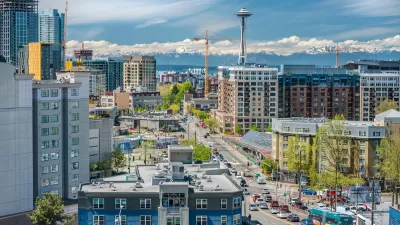The city aims to build 20,000 units of affordable housing by 2025, but as housing costs continue to increase, more Seattleites are being squeezed out of their homes.

Despite almost doubling the city’s spending on affordable housing in the last few years, Seattle still faces a housing shortage, writes Josh Cohen in Crosscut.
“In 2017, the Office of Housing awarded $93.4 million to affordable housing developers to build 944 units of new housing. In 2018, the number dipped to $75.19 million in awards, but that was enough for 1,197 units of affordable housing. Last year, the Office of Housing’s affordable housing investment grew to $153 million, enough to build or acquire 1,910 units (several affordable housing developers were able to buy existing market-rate apartment buildings during the pandemic and operate them as subsidized housing).”
However, Cohen points out, “Years of insufficient housing construction, combined with Seattle’s seemingly endless cost-of-living increases, mean those new apartments still won’t be enough to meet the needs of Seattleites being squeezed out of the city or pushed into homelessness.” With costs of everything from land to construction supplies rising, making building affordable housing even more complicated.
According to Seattle Office of Housing interim director Maiko Winkler-Chin, funding the amount of housing necessary will likely require renewing and increasing the Seattle Housing Levy, a $290 voter-approved property tax set to expire in 2023.
FULL STORY: Seattle nearly doubled affordable housing funds. Is it enough?

Maui's Vacation Rental Debate Turns Ugly
Verbal attacks, misinformation campaigns and fistfights plague a high-stakes debate to convert thousands of vacation rentals into long-term housing.

Planetizen Federal Action Tracker
A weekly monitor of how Trump’s orders and actions are impacting planners and planning in America.

Chicago’s Ghost Rails
Just beneath the surface of the modern city lie the remnants of its expansive early 20th-century streetcar system.

Bend, Oregon Zoning Reforms Prioritize Small-Scale Housing
The city altered its zoning code to allow multi-family housing and eliminated parking mandates citywide.

Amtrak Cutting Jobs, Funding to High-Speed Rail
The agency plans to cut 10 percent of its workforce and has confirmed it will not fund new high-speed rail projects.

LA Denies Basic Services to Unhoused Residents
The city has repeatedly failed to respond to requests for trash pickup at encampment sites, and eliminated a program that provided mobile showers and toilets.
Urban Design for Planners 1: Software Tools
This six-course series explores essential urban design concepts using open source software and equips planners with the tools they need to participate fully in the urban design process.
Planning for Universal Design
Learn the tools for implementing Universal Design in planning regulations.
planning NEXT
Appalachian Highlands Housing Partners
Mpact (founded as Rail~Volution)
City of Camden Redevelopment Agency
City of Astoria
City of Portland
City of Laramie





























